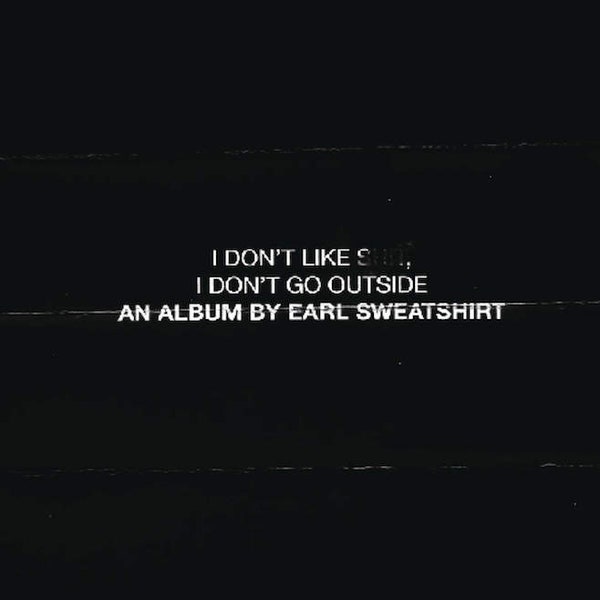Paul Thompson is so woke he actually runs WIDEawake
My phone is cut off. My car’s being held hostage by the City of Los Angeles. Like Aubrey, I haven’t left the condo in a week now. I should buy razors, I should write to my mom, I should grab the shoes that are airing out on the balcony and go on a run. Instead, I’m perched on the roof of my building, chain smoking and listening to I Don’t Like Shit, I Don’t Go Outside. I feel pretty good.
Its author isn’t exactly a populist. Earl Sweatshirt’s Internet-only, self-titled debut album was an exercise in form, off-putting by design and pitched at a frequency too shrill for anyone born before 1981. When he was ferried home from a Samoan boot camp, his friends were famous and chanting his name at sold-out shows. Instead of playing the savior, he waffled, striking out on his own and loudly wondering whether he should rap at all. Now, he’s railing against his label, Sony, for botching the roll out of a thirty-minute album that’s reportedly been finished for months. “Depressing” has been thrown around as a descriptor, but Earl isn’t sad at all. He’s bitter and dispossessed and anxious when the Xanax wears off. Earl Sweatshirt doesn’t care about connecting with you or me, or being quote-unquote “relatable.” He seems like my kind of guy.
Earl’s misanthropy is refreshing. From the first time he floated through RSS feeds, he’s ducked comparisons to Eminem—the graphic violence, the rape fantasies, the syllables that come ceaselessly. But where Marshall Mathers slid from TRL wish fulfillment to drug overdoses and, eventually, whatever he thinks he’s doing with Rihanna, Earl’s reaction has been the opposite. Instead of processing fame as a cross to bear as “Rap Star Slash Martyr,” he sounds ready to shirk the whole thing at any minute. Some saw the sprawling Doris as a rejection of what waited for him when he returned from Samoa, and his stock has only risen. But I Don’t Like Shit isn’t a reclusive artist working through his struggles with fame. It’s written by a kid whose phone would be flitting back and forth from airplane mode no matter his profession. From “Mantra”:
“And you ain’t ask for this
Now you surrounded with a gaggle of
a hundred-fucking-thousand kids
Who you can’t get mad at when they want a pound or pic
‘Cause they the reason that the traffic on the browser quick
And they the reason that the paper in your trousers thick.”
So he gets it. Anyone who has heard a few bars from Earl knows his fuse is probably too short to work a 9-to-5, and so, if his rent is to be paid, he’s going to be tagged in an obscene number of Instagram pictures from now until his Medicare kicks in. But he doesn’t have to enjoy it.
And so Earl leans into the abyss. Self-pity plays at Top 40, but Earl’s emotional lows are filtered through his sneer. “Grief,” I Don’t Like Shit’s closest thing to a single, “sounds like a gavel when it knocks.” On “Grown Ups,” Earl’s rundown of his closest family members isn’t so much heartfelt as it is vaguely condescending. Though such an abbreviated running time would seem to have the advantage of keeping a record focused, Earl instead uses it as a safety net—he can circle the drain but never quite fall in.
More interesting than the mechanics of Earl’s neuroses are the moments where he can cut loose. On “AM / Radio,” he follows the tremendous turn from Ratking’s Wiki by snapping upright, darting through a fractured timeline littered with numerals and slurs.
“In ’09 we took the seven to the deuces, 17 to the block
Bitch, if yo nigga had Supreme
we was the reason he copped it
Nowadays, I’m on the hunt for mirrors to box with.”
That quick turn from past to present tense—”we was the reason he copped, I’m on the hunt for mirrors to box”—is the kind of social-climbing flex on which a rapper will try to stake his or her whole career. Earl pulls it off, because he isn’t reminiscing with his feet up in a boardroom, a decade removed from his heyday. He’s moved inward, gotten more jaded, more insular. This is him at his leanest, sharpest, meanest, best. The next song, “Inside,” remembers his first apartment, where “niggas was really smoking” and leaving roaches strewn about. They’re not invited over anymore.
You could construct a pretty compelling argument that no Odd Future member, save for maybe Frank Ocean, has dropped a truly definitive work since Tyler and Hodgy played piggyback with Jimmy Fallon five years ago. I Don’t Like Shit, I Don’t Go Outside is too slight to be hailed as a masterpiece, its scope too narrow to book Earl at festivals that weren’t already knocking at Clancy’s door a year ago. But it is his best qualities as a rapper distilled. (And as a producer—Earl himself handled nine of the 10 tracks.) And though Long Beach’s Vince Staples gets the best of him on “Wool,” the album’s closer and best song, Earl succeeds in pitching himself as someone without peers, someone who shouldn’t be made to go out in public because he simply doesn’t have the patience for it. He’s fine with that. And while he’s holed up alone, he might as well rap.


